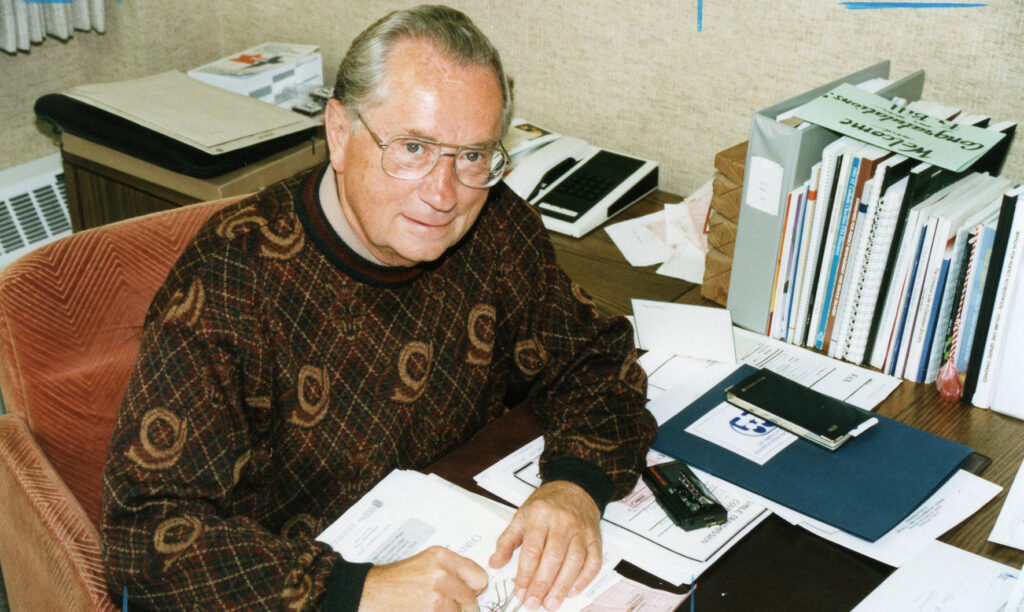Monsignor William Irwin is ingrained in the history of Alberta and its Catholic community.
In 1961, Irwin founded Catholic Social Services, which has grown to become one of the largest agencies of its kind in Alberta. With a staff of 1,825, CSS provides services in the areas of homelessness, domestic abuse, addition recovery, pregnancy support, immigration and settlement, and disability outreach. In 2018 alone, the agency served more than 21,000 people in Alberta.
Irwin was steadfast in his belief in CSS’ mission to love God and one another, and to fulfill its work in accordance with Catholic social teaching – even in a time of pushback.
It’s a lesson that still applies today, says former premier Ed Stelmach, adding that “Father Bill” Irwin – and his legacy through CSS – continues to be a source of personal inspiration.
“No matter what the uphill battle is, no matter the challenges, whatever the current social norms are, he strove to live the mission of Catholic social teaching,” said Stelmach, as Catholic Social Services thanked its sponsors and honoured Monsignor Irwin.
“As a former premier for the government of Alberta, I know that government can’t do it all. No matter how much government thinks we can tax to meet the needs of the vulnerable, marginalized, and all the needs of all Albertans, they will need partners like Catholic Social Services and Covenant Health to help.”
Stelmach, currently chair of the Covenant Health board, served as Alberta’s premier, leading the Progressive Conservative government from 2006 to 2011. He was the guest speaker at this year’s Father Bill Irwin Luncheon June 4.
To the people across Alberta that have been helped by CSS’ services, the gratitude is ultimately owed to Monsignor Irwin.
“The work he did was really a ripple of hope for Alberta,” said Troy Davies, the chief executive officer of Catholic Social Services. “That ripple continues to grow and a have a life changing impact on thousands of people every day.”
Stelmach takes inspiration in Irwin’s efforts to open Edmonton’s Kairos House – the province’s first residency to assist those living with HIV and AIDS – in 1987, a time when support for AIDS patients was controversial and often limited.
“It was a testy period when Irwin set up a way to help those with AIDs,” Stelmach said. “He received a lot of hate mail. He persevered and that is the leadership we have to show.”
Covenant Health faced controversy last year over how assessments are done at its facilities for patients who want to end their lives under provisions of the medical assistance in dying law. Assessments for MAiD can occur on Covenant Health sites.
“We managed to arrange a policy with the previous provincial government that reflects Catholic social teaching,” Stelmach said. “But there may be new challenges that arise on that issue.”
Stelmach is worried about proponents of MAiD looking to expand the laws.
He also said, while it may not be reflected in the pews, Canadians see the value – and support the work – of Catholic institutions.
“The millennial population today you don’t see in the pew on Sunday but they do support programs that help the vulnerable and marginalized. We have to keep building on that,” he said.
“We’ve gone through these periods before, we have been challenged in Catholic education and Catholic health care, but as long as we run our programs effectively and show that value, people will support the programs that deliver.”
Stelmach experienced first-hand the value of Catholic health care. When he was in the first grade, a serious playground accident left Stelmach with a double fracture in his left femur. He was hospitalized in a full body cast for several months.
The nuns at the Mary Immaculate Care Centre in Mundare not only restored him back to health, they also taught him how to read, improve his English, and learn basic math. That experience left a lasting impression.
“This relationship I had with the sisters was quite transformative and healing,” Stelmach said. “They saw me as more than a patient. They not only cared for the body, but for mind and soul. That’s the essence of Catholic health care… upholding the sacredness of life at all stages and caring for the whole person – body, mind and soul.”
Stelmach said the role of Catholic institutions in health and social services isn’t widely known.
“We have to tell the story of Catholic health care. At one time 90 per cent of hospital beds in Canada were in Catholic institutions; nobody else was providing those services. In my area of Mundare and Vegreville, all the first hospitals were built by the sisters, and even today the Church is the only provider of health care in many countries,” he said.
“To bring that care into our communities, that really is living the Christian life. That’s what the sisters did and that’s what Father Bill did.”
Given the role Catholic institutions have played in health and social services throughout the province’s history, Stelmach says there’s no doubt that Catholic Social Services and Covenant Health will continue that role into the future.

